|
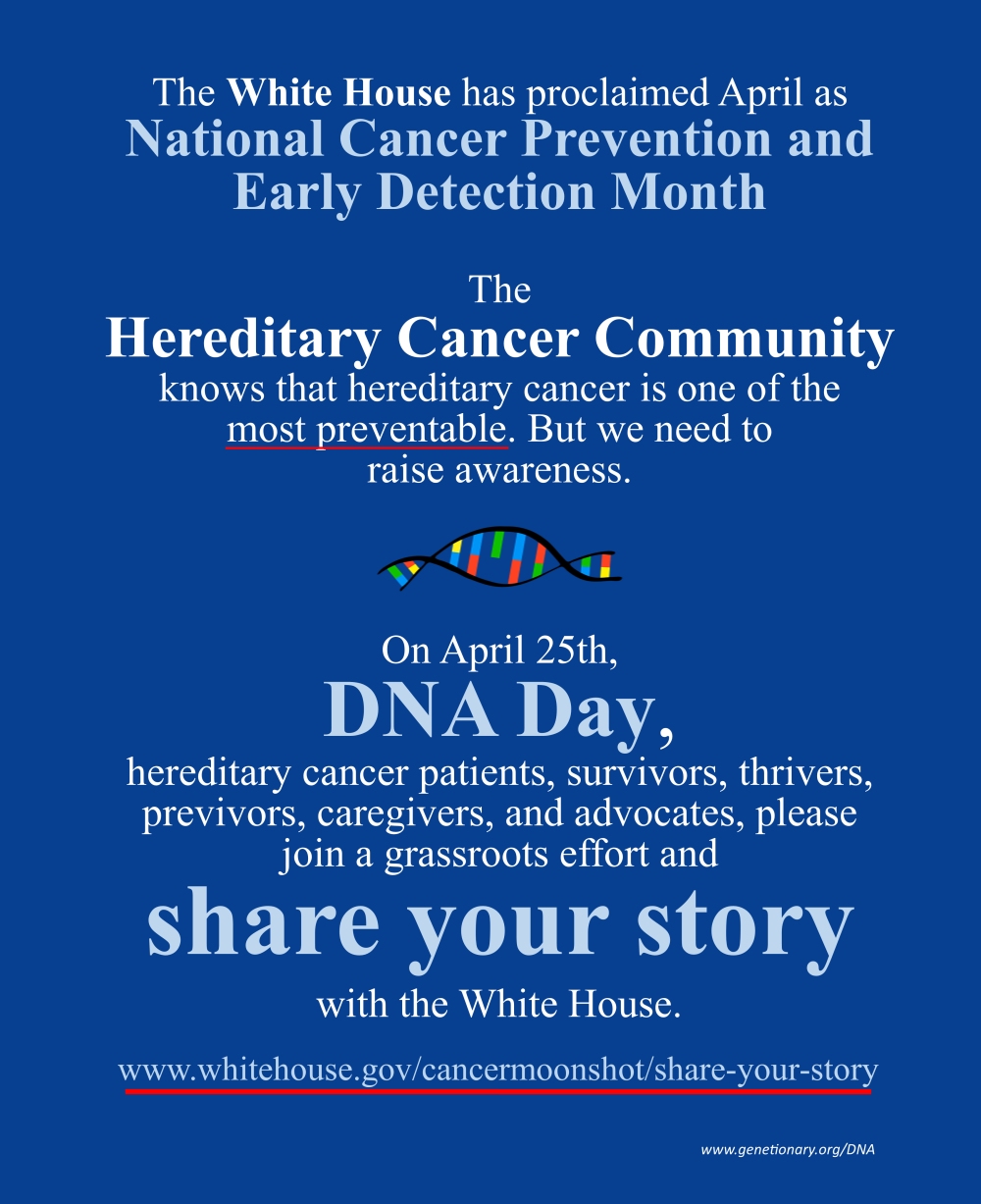
|
|
A
|
| AIP gene
germline mutations
are associated with Familial Isolated Pituitary Adenomas.
|
| AKT1 genes contain instructions for making a protein called AKT1 kinase, which helps control cell division and growth. It also helps control the self-destruction, or apoptosis, of cells that are not functioning properly or are no longer needed.
|
| APC (adenomatous polyposis
coli)
gene provides the genetic instructions for making APC protein, a tumor suppressor.
Germline APC mutations may increase the risk for colorectal
(colon) cancer, intestinal cancer, and other cancers. Familial Adenomatous
Polyposis (FAP) can be caused by a germline mutation in an APC gene.
|
| Apoptosis is
the process of programmed cell death, which is the self-destruction of cells that are not functioning properly or are no longer needed.
|
| ATM is a
tumor suppressor gene.
It helps repair damaged DNA. Germline mutations in this gene are associated with lymphoma, leukemia, stomach cancer, brain cancer, ovarian cancer, breast cancer, skin cancer, liver cancer, and others.
|
| AXIN2 gene
germline mutations are associated with colorectal (colon) cancer.
|
| B
|
| BAP1 gene
provides instructions for making BRCA1-Associated Protein1, which helps control cell growth, repair, and cell death.
Germline mutations in this gene are associate with BAP1 Tumor Predisposition
Syndrome and an increased risk of melanoma, mesothelioma, and other cancers.
|
| BARD1 gene works in
conjunction with the BRCA1 gene to repair damaged DNA and also
as a tumor suppressor gene. BARD1
germline mutations are associated with an increased risk of neuroblastoma, lung, breast, and cervical cancers.
|
| Biomarker Testing
looks for proteins, genes, and other substances found in body fluid and tissue. Since each person's cancer is different,
biomarker testing can offer information about the particular cancer. It also can often offer clues
to what treatments would be the most effective.
|
| BMPR1A gene makes a protein that regulates cell growth and division. Germline mutations in this gene are associated with Juvenile Polyposis
Syndrome and an increased risk of colorectal (colon), stomach, and intestinal cancer.
|
| BRCA stands
for (BReast
CAncer gene). Like many other tumor suppressor genes, everybody has
BRCA1 & BRCA2
genes. They produce proteins that help repair damaged DNA and prevent
cancer. Germline mutations in these genes are linked to
various types of cancer, including breast (men and women),
ovarian, prostate, melanoma, and others.
|
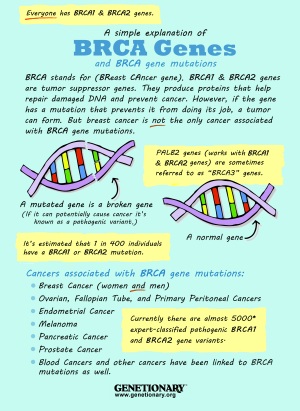
Download
the PDF
|
| BRIP1 or BRCA1 Interacting Protein 1, works with BRCA1 to repair DNA.
Germline mutations in a BRIP1
gene may increase your risk for ovarian cancer and breast cancer.
|
| C
|
| Cascade Testing
is one of the most important steps in breaking the cycle of hereditary cancer in families. This testing-sharing-testing-sharing of genetic information plays a vital role in protecting the health and lives of loved ones in families with a history of cancer.
Cascade
testing requires
two
very important steps:
1. Having testing done.
2. Sharing information.
That includes sharing test results and the specific mutation in the gene, like
5385delAG in BRCA1.
The information should be shared with all these living genetic relatives: parents, siblings, aunts, uncles, nieces, nephews, and cousins.
And it needs to be shared as soon as the information is known.
(More helpful tools for sharing info with family here.)
|
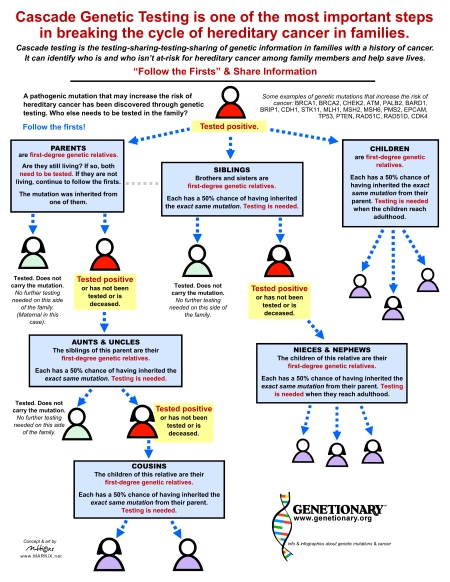
Cascade
Genetic Testing PDF
Pruebas genéticas en cascada PDF
|
| CDC73 gene carries the instructions for producing a protein called parafibromin, a tumor
suppressor. Germline mutations in CDC73 are associated with renal and endocrine cancers.
|
| CDH1 gene is involved in making epithelial cadherin protein. A
germline mutation in a CDH1 gene is associated with Hereditary Diffuse Gastric Cancer (HDGC) syndrome
which increases the risk of gastric, breast, colorectal, ovarian and thyroid cancers.
|
| CDK4 gene is a tumor suppressor gene. A CDK4 mutation is associated with an increased risk hereditary melanoma and other cancers.
|
| CDKN1B gene carries the instructions for producing p27 protein, a tumor suppressor protein involved in cell growth and division. Germline mutations in CDKN1B are associated with Multiple Endocrine Neoplasia Type 4 (MEN4) pituitary, parathyroid, and pancreatic neuroendocrine tumors.
|
| CHEK2 (CHEckpoint
Kinase 2) is protein-coding gene. It is another tumor suppressor gene that helps with DNA repair.
A germline mutations in this gene is linked to various types of cancer, including breast, ovarian, prostate, colon, and others.
|
| Cowden Syndrome
is a hard-to-recognize condition characterized by benign overgrowths called
hamartomas. There is an increased lifetime risk of breast, thyroid, and other cancers. Germline mutations in PTEN, AKT1, and PIK3CA genes have been linked to the syndrome.
|
|
D
|
|
De Novo Mutations are
DNA changes that were not inherited. De novo mutations can occur
at conception, during embryonic or fetal development, after birth, or later in life.
|
| DNA or
Deoxyribonucleic acid, is the material that holds genetic instructions for the development,
functioning, and traits of every living organism on the planet. |
| E
|
| EGFR
gene carries the instructions for making Epidermal Growth Factor Receptor (EGFR) protein. EGFR is a protein that helps cells grow. Germline mutations in the EGFR gene are linked to a predisposition to lung cancer and other conditions.
|
| EPCAM gene
germline mutations can increase the risk of Lynch
syndrome. Which includes many cancers, but particularly colon and the rectal cancer and uterine cancer.
|
| F
|
Family Health/Cancer History Pedigree Knowing your family's health history, especially if there is any history of cancer, is very important.
Download
the Family Health/Cancer History Pedigree PDF to fill out to take to your doctor and/or genetic counselor.
|
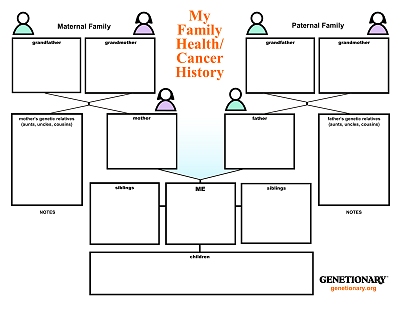
Download
the PDF
|
| FH
(Fumarate Hydratase) is a tumor suppressor gene. Germline mutations in this gene are linked to uterine fibroids, renal/urinary
track cancer and endocrine cancer. |
| Follow
the Firsts is a concept in
cascade testing for germline mutations
that no matter who is being tested, there is always another first-degree relative that might need to be tested as well.
Download
the infographic. |
| G
|
| Germline Mutation.
In simple terms, germline means the DNA that you inherit at conception. Germline mutations are broken parts of certain genes that you may inherit at conception. Some germline mutations might put you at risk for developing cancer.
|
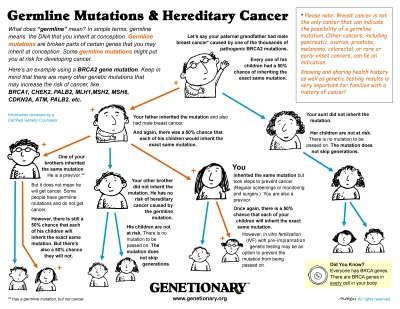
Download the PDF
|
| H
|
| Hamartomas
are usually slow-growing noncancerous tumors. However, hamartomas may increase the risk of certain cancers. Hamartomas can grow almost anywhere on the body, but are typically found in the lungs, breast, and colon. Hamartomas are usually caused by an inherited genetic mutation.
|
| HBOC stands for
Hereditary Breast and Ovarian Cancer Syndrome. It is an inherited increases the
risk for breast, ovarian, and other cancers. HBOC is caused by germline mutations passed down in families. BRCA1 and BRCA2 mutations are the most common ones associated with HBOC. PALB2, ATM and CHEK2 are some of the other mutations also associated with
HBOC.
|
| HDGC stands for
Hereditary Diffuse Gastric Cancer Syndrome which increases the risk of gastric, breast, colorectal, ovarian and thyroid cancers.
|
| Hereditary Cancer
Week is a yearly event that begins on the last Sunday in September, with National
Previvor Day being celebrated on the Wednesday of the week. In 2010, Congress unanimously passed a resolution creating National Hereditary Breast and Ovarian Cancer Week and National Previvor
Day. Since then, the week has been renamed National Hereditary Cancer Week
to encompass all the hereditary cancers.
|
| I
|
Inherited Mutations
(see germline
mutations)
Infographics about inherited Lynch Syndrome and BRCA mutations:
|
| J |
| K
|
| KIT germline mutations are associated with rare Familial Gastrointestinal Stromal Tumors (GIST). |
|
L
|
|
Li-Fraumeni Syndrome is a rare inherited condition that increases the risk of breast cancer, osteosarcoma, gliomas and leukemia. Mutations in the
TP53
gene are associated with this disorder.
|
|
Lynch Syndrome is an inherited genetic condition associated with an increased risk of colorectal (colon) cancer, endometrial, ovarian cancer, pancreatic cancer, and other cancers. MLH1, MSH2, MSH6, PMS2, and EPCAM germline mutations are all linked to the risk of Lynch Syndrome.
|
| M |
| Mutation --
in genetics, a mutation is a DNA sequence
change that was caused by deleting, adding, or replacing parts of your DNA.
Genetic mutations can be
somatic or germline. And
they can be either benign (causing no harm) or pathogenic
(increased risk of disease.) |
| MLH1, MSH2,
MSH3, MSH6, germline mutations
in these genes can increase the risk of Lynch
syndrome. Which includes many cancers, but particularly colon and the rectal cancer.
|
| MUTYH gene is a DNA repair gene. A germline mutation in this gene can increase the risk of colorectal (colon) cancer, thyroid cancer, ovarian cancer, and other cancers. |
| N
|
| Neoplasms are abnormal growth of cells in the body. They can be cancerous or benign (non-cancerous).
|
| NF1 gene carries the genetic instructions for producing neurofibromin protein, a tumor suppressor. Germline mutations is this gene are associated with breast cancer, endocrine cancer, nervous system cancer, brain cancer, and gastric cancer.
|
| O |
| Oncogenes are genes that control cell growth and division that have mutated. Oncogenes have the potential to cause cancer by causing loss of function or uncontrolled cell growth.
|
| Other Helpful
Materials -- These materials
may be helpful for explaining genes, genetics, and genetic
mutations that may increase the risk of cancer to others.
|
| P
|
| PALB2
genes work with BRCA2 genes in DNA damage repair. Germline mutations in PALB2 genes increases the risk for breast cancer, pancreatic,and ovarian cancer. PALB2 genes are sometimes referred to as “BRCA3” genes.
|
| Pathogenic Variant
(mutation)
is a change in a gene that increases
the risk of diseases like cancer.
|
| Peutz-Jeghers Syndrome
(PJS) is an inherited cancer syndrome involving mutations in the
STK11 gene. PJS is a hereditary cancer syndrome characterized by gastrointestinal polyps and dark spots in the body and an increased cancer risk.
|
| PMS2
is one of the genes known as a mismatch repair
(MMR) genes. A germline mutation in a PMS2 gene is a cause of Lynch
syndrome. This mutation increases the risk for colorectal (colon) cancer, uterine (endometrial) cancer, and other cancers.
|
|
PTEN
is a tumor suppressor gene. Germline mutations in this gene are linked to
Cowden Syndrome which increases your risk to breast cancer, uterine (endometrial) cancer, thyroid cancer, colorectal (colon and rectal) cancer, kidney cancer.
|
|
Previvor is someone who has not been diagnosed with cancer but is at a higher risk for cancer due to certain genetic mutations (BRCA1, BRCA2, CHEK2, ATM, PALB2, PTEN, MLH1, MSH2, MSH6, etc.) or family history.
Being a previvor does not mean you will get cancer. But a previvor needs to be proactive and monitored appropriately to reduce the risk. Many hereditary cancers can be detected early and successfully treated, or even avoided all together with preventative action.
|
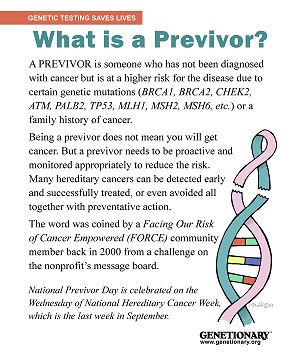
Download
the PDF
|
| Q |
| R
|
| RAD51C, RAD51D genes
are
essential for DNA repair. Germline mutations in these genes are linked to breast and gynecologic cancers (cervical, ovarian, uterine). |
| S
|
|
SDHA
genes provide the instructions for making one part of succinate dehydrogenase (SDH) enzyme. This enzyme plays an important role helping convert food into a form of energy that cells can use. Germline mutations in SDHA genes are linked to gastrointestinal and endocrine tumors and cancers. |
| Sharing
Genetic information
|
|
Somatic Mutations
are genetic changes that happen occur after conception to the some of the cells in your body. Somatic mutations are normal and happen throughout your life. However, some of these mutations can affect your health.
|
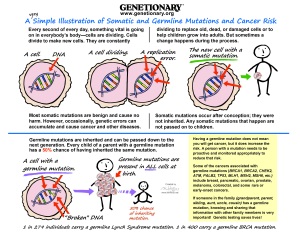
Download
the PDF
|
|
STK11 genes are a tumor suppressor genes that helps regulate cell growth and programmed cell death. Germline mutations in the STK11 genes are the cause most cases of
Peutz-Jeghers Syndrome.
|
| T
|
|
TP53 is a tumor suppressor gene. It is the most frequently mutated gene found in cancer. Germline TP53 mutations are linked to breast, colorectal, and other cancers. It is also associated with
Li-Fraumeni syndrome.
|
| U
|
|
Unknown Primary or Cancer of Unknown Primary (CUP) is when it is uncertain which organ or tissue a cancer originally came from. CUP can be associated with inherited cancer syndromes. |
UGT1A1
is a gene that codes for an enzyme involved in normal liver metabolism. A normal variation (a polymorphism) of the UGT1A1 gene called UGT1A1*28 is associated with a hereditary syndrome called Gilbert's Syndrome which affects about 10% of the population. Gilbert syndrome is a benign condition that causes the liver to have problems removing bilirubin from the blood.
However, with a UGT1A1 polymorphism, you may metabolize specific chemotherapy drugs differently - namely
Irinotecan which is commonly used in colorectal cancer - causing more of the drug to build up in your system which causes more drug side effects. Before taking
Irinotecan or other drugs in this class, you should be screened for UGT1A1 polymorphism. |
| V
|
| Variant
-- in genetics,
is a permanent alteration in a gene's DNA makeup. See mutation. |
| Variant of
Uncertain Significance (VUS) is a change in a gene, but it is unknown whether that variant is actually connected to any health condition, such as cancer. Determining whether or not a VUS is disease-causing can be
a lengthy process that relies on multiple sources of gathered evidence. |
| W |
| Werner's Syndrome
affects children/young adults and predisposes them to cancer due to an inherited mutation in the WRN gene which may cause errors in DNA to accumulate.
Werner's Syndrome is an autosomal recessive syndrome, which means a mutated gene from both parents must be
passed on for a child to be affected. |
| WRN Genes
are DNA repair genes. WRN genes provide instructions for producing the Werner protein, which is critical for repairing damaged DNA. |
| X. |
| Xeroderma Pigmentosum
are is an inherited syndrome predisposing individual to skin cancer, including melanoma, caused by mutation in the XP gene. XP genes are involved in repairing DNA. Xeroderma Pigmentosum is an autosomal recessive
syndrome, which means a mutated gene from both parents must be
passed on for a child to be affected. |
| Y
|
| Z
|
|
|
Click on the
image to
download the PDF.
PDFs are free to use
as long as the
art and text are not changed.
|
|
If you have been
diagnosed with a germline mutation, hereditary cancer, or need
genetic counseling and testing because of family cancer history,
visit these nonprofit organizations for assistance:
|
|
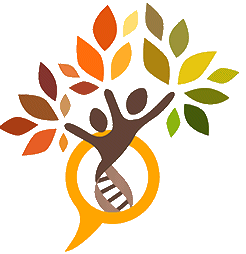
Connect
My Variant
Prevention through connection. Connect with relatives to reduce
inherited disease risk.
|
|
FORCE-Facing Our Risk of Cancer Empowered
Helping to improve the lives of individuals and families facing hereditary cancer.
|
|

My Faulty Gene is a nonprofit organization which provides information and assistance to underrepresented, uninsured, and underinsured individuals whose family medical history suggests genetic testing might be helpful in identifying an increased risk of disease due to a genetic mutation.
Genetic testing saves lives!
|
|
Jacqueline
Rush Foundation
Helping to save lives by improving public and medical community awareness of Lynch Syndrome and to raise funds for Lynch Syndrome research.
|
|
NSGC
Find a genetic counselor at the National Society of Genetic Counselors.
|
|
26.2 Step Mini Marathon
is a one-of-a-kind event. It brings the fun of a mini marathon together with the goal to raise awareness of high-risk cancers; to empower people to make a health care plan; and to help them take those next action "steps". |
|
National Institutes of Health National Library of Medicine
Explore the normal functions of human genes and the health implications of genetic changes.
|
|
Other
Cancer-Related Resources
|
|
|
|
![]()